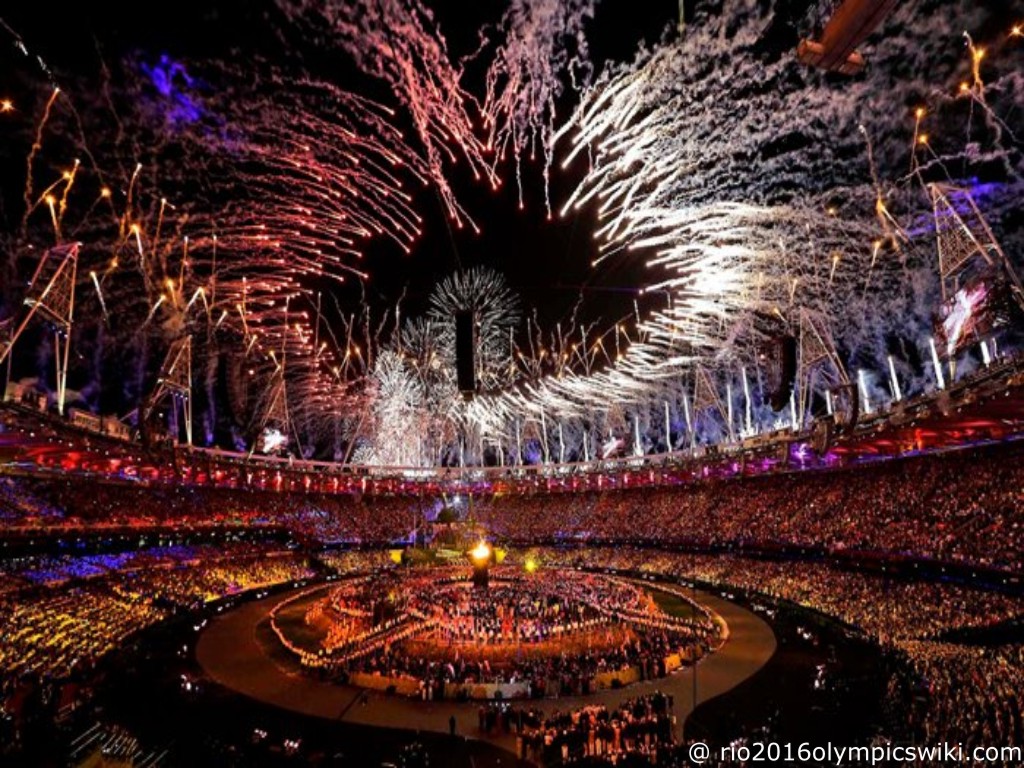
Rio Olympics get underway
The 2016 Olympic Summer Games got underway Friday night in Rio de Janeiro in a festive opening ceremony filled with the traditions of the host country, a message of environmentalism and a call for unity.
The Olympic torch ended its 95-day worldwide journey in front of an estimated crowd of 70,000 at Maracana Stadium, with marathoner Vanderlei Cordeiro de Lima lighting a small cauldron.
The festivities got off to somewhat of a rocky start with protesters confronting police in the area, but the show featured pageantry from the host country and around the globe. The ceremony also included the first refugee team in history, which organizers called a "message of hope."
The opening ceremony featured three key themes: reinvent, rejoice and replant. The event opened with several projected images of water and moved into significant events in Brazilian history, including a presentation of the "beginning of life," the "birth of the forest" and a tribute to the indigenous people who occupied Brazil in the past and present, according to the BBC. Acrobats then mimicked the movement of ships to symbolize when Europeans arrived to the continent in the 1500s.
With a series of complicated projections, emerging buildings looked as if they were popping out of the stadium floor, in an effort to depict the rise of the major contemporary cities in Brazil.
One of the most internationally famous Brazilians, Gisele Bundchen, came out out of retirement and walked for more than two minutes in a shimmering low-cut gown in what reportedly may be the last catwalk of her life. Her forefathers came to Brazil in a wave of immigration from Germany, the BBC reported.
The projections then turned to a multitude of colors, representing the festival of Carnival, followed by a massive dance party on the stadium floor. When the party ended, the ceremony became more somber, with environmental issues at the forefront. Projections depicted the melting of ice caps over time and the way it has caused sea levels to rise worldwide.
Upholding tradition, Greece was the first country to march onto the floor, as it was the origin of both the ancient and modern Olympic games.
Eighteen-time gold medalist Michael Phelps led Team USA's 555 athletes and held the flag during roll call.
Two-time Wimbledon winner Andy Murray bore the flag for Great Britain and Northern Ireland. Later, the stadium erupted when the refugee team was introduced. The team, made up of survivors of war and persecution, represents the 65 million people displaced around the world. Brazil, the host country, was introduced last.
The opening ceremony in London in 2012, which featured appearances from Queen Elizabeth II herself and Daniel Craig in character as James Bond, has set the bar high for the events in Rio. But, the budget for Rio's ceremony was significantly less, BBC reported.
A notable flag-bearer was Pita Nikolas Aufatofua of Tonga, whose shirtless and apparently shiny physique lit up social media. He will compete in Taekwondo.
After all of the countries were introduced, the stadium fell dark again, with representations of rich vegetation filling the floor. Green confetti fell through the stadium before a myriad of fireworks erupted.
President of the International Olympic Committee and former Olympic champion fencer, Thomas Bach, addressed the crowd and sang Brazil’s praises.
“These first-ever Olympic games in South America will go from Brazil to the entire world,” he said. “Brazilians can be very proud tonight.”
“You have transformed the wonderful city of Rio de Janeiro into a modern metropolis and made it even more beautiful,” Bach continued. “Our admiration for you is even greater because you managed this at the very difficult time in Brazilian history.”
Bach then spoke directly to the refugee team, telling them they are “sending a message of hope” to their fellow refugees around the globe.
“You had to flee from your home because of violence, anger or just because you are different,” he said. “You are making a great contribution to society.”
Kip Keino, considered to be the godfather of Kenyan long distance running, was the first recipient of the Olympic Laurel Award, created by the IOC to honor outstanding athletes for their social contributions.
Keino and his wife have adopted 90 children, BBC reported, and he founded the Kip Keino school in Eldoret, Kenya. During his speech, he requested that people join him in his efforts to achieve “basic humanity all over the world,” which includes food, shelter and education.
The Olympic Laurel Award will be awarded at every Olympic opening ceremony going forward.

 Click the link to read your copy.
Click the link to read your copy.